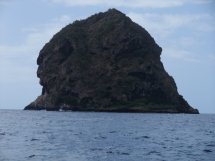Thursday 22/3/12 - Hermitage Bay, Five Islands, Antigua

|
Our
plan for a decently long lie this morning to compensate for yesterday’s pre-dawn
start was interrupted by a missed phone call from the UK before 0600 – from an
unidentified number, probably a call centre, which was permanently engaged when
we tried to call back to check it. We have had a few of these out here, usually
in the night, and not easy to ignore just in case it is something important.
At
least it got us up early for another day of boat work! A bit of engine
maintenance, some electrical repairs, and the inevitable laundry whilst the
generator was running and the inverter switched on. It took the mind off another batch of
insect bites which were really itchy….having forgotten to put the insect
repellent on yesterday. You get quite ansty about them when suffering, and the
fly swats have had another good outing! Likewise the spray and the mosquito
devices have been deployed freely. A little
madness creeps in, and it obviously has affected folk
through the ages. One
of the apocryphal old naval stories here is that Nelson’s predecessor at the
Dockyard which bears his name lost his eye in a bit of similar madness- he was
chasing a cockroach with a fork which took out his eye….maybe too much grog
beforehand! Naval
Lore
Most
of these islands bear witness to a torrid past when colonial powers grabbed land
to exploit, defend routes, provision boats, kidnap ships and treasures, and
strike at enemies (and sometimes friends). The names of harbours,
features and islands hark back to Columbus (who ran out of saints and had
to start calling new ones after his boats), Napoleon, Nelson (who made his mark
here, there and everywhere), Jolly, Rodney et al. The British, Dutch, French and Spanish
plundered and stole from one another, and the islands became bases to be
attacked and defended. The
islands are littered with towns or places called “Fort de France”, “Falmouth
Harbour”, Baie Des Anglais”, “Spanish Point” , “Codrington”, redolent of naval
egos, places back in Europe, or people missed by captains stationed here for a
year or two (“Charlotte Point , perhaps?). One
of the most peculiar and interesting stories about the British and the French
relates to Martinique, where the French prevailed (then and now). Whilst
Napoleon had done his worst in land battles in Europe, the French navy was not
as successful. In the Caribbean, Britain had managed to take or hold a number of
islands, but Martinique remained firmly in the French camp. You will probably
know that Britain was pretty well bankrupt (then and now!), and could not afford
to build and run enough ships of the line to do all that was asked of the navy.
Just
off the south west tip of Martinique, and towering over the approaches to the
protected harbours of Fort de France and Le Marin, is a vertiginous island
called Diamond Rock. It looks a bit like a squashed Ailsa Craig, but without the
access shelf. One dark night, the mad Britons decided it would make a good,
cheap and unsinkable naval stronghold, and they climbed it under the cover of
darkness (avoiding the poisonous snakes en route), and hauled up some cannon and
ammunition with block and tackle, christening it HMS Diamond Rock. French vessels approaching the island in
the following months were shelled relentlessly, and Napoleon went berserk when
he was informed (Empress Josephine was born on the island, so it was something
of a slight on the little fellow’s manhood). Napoleon’s
Admiral Villeneuve was dispatched to take the Rock back into French hands, and
managed to do so since Nelson’s fleet was elsewhere when he arrived. Good news (an easy victory) and bad news
for Villeneuve (Napoleon had ordered him to sink Nelson whilst he was at it, but
Villeneuve knew he was outgunned and therefore snuck back towards France). The
outcome was that he was told to report back in disgrace. Villeneuve
may not have been daft enough to go looking for Nelson in the Caribbean, but he
was a man of honour and rather than have Napoleon take his head off for fun at
court, he decided to confront the British at the Battle of Trafalgar, and die
with dignity (along with his many men!). Again, he just couldn’t get a thing
right, losing the battle but surviving whilst Nelson died in his stead! V Watergaw |
